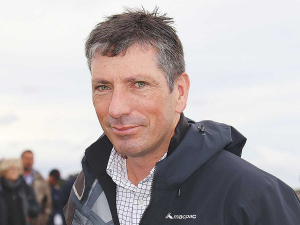M.I.A.
OPINION: The previous government spent too much during the Covid-19 pandemic, despite warnings from officials, according to a briefing released by the Treasury.
 Beef+Lamb NZ chief executive Sam McIvor says the COVID-19 pandemic has forced the red meat industry good organisation to think differently about how it does business with farmers.
Beef+Lamb NZ chief executive Sam McIvor says the COVID-19 pandemic has forced the red meat industry good organisation to think differently about how it does business with farmers.
Beef+Lamb NZ chief executive Sam McIvor says the COVID-19 pandemic will likely mean that his organisation will end up engaging with more people than it has done in the past.
He says the pandemic has forced the red meat industry good organisation to think differently about how it does business with farmers.
“Already there are some positive outcomes with farmers listening to podcasts and participating in webinars.”
McIvor says some people, especially those with young families, are too busy during the day to attend events and field days. But they are now interested in joining on-line discussion groups in the evening when the children are in bed.
He says after the Kaikoura earthquake, which put BLNZ’s office in Wellington out of business for a few days, the organisation instigated a business continuity plan that made provision for staff in NZ and overseas to work remotely from home, which was again implemented before the Level 4 lockdown.
“We were prepared for the lockdown. As the Government made decisions, we were actually ahead of them in moving our people to work remotely and – by and large – so far it has worked well.”
McIvor says a significant part of BLNZ’s business is regional and extension programmes – a lot of which normally involve face-to-face contact with farmers at large conferences through to workshops, field days and network groups.
“So not being able to do that is a major disruption to our business and naturally affects farmers as well,” he told Rural News.
“We know that farmers learn best from other farmers and there is a social aspect to that, which is really important as well. Right now, they are not only dealing with COVID, but also a lot of regulatory and climate change issues as well. So, the ability to sit down and talk to others is a really important aspect for farmers and all of sudden that face-to-face tool has been withdrawn.”
As part of its planning, McIvor says BLNZ has been creating new ways of getting information to farmers during the past two years. Last year, more than 9000 farmers listened to BLNZ’s podcasts, and videos, which McIvor says have been used to help spread important information out to farmers.
“On-line is the new way with webinars replacing field days and, in many, cases reaching out to more people,” he adds. “For example, we streamed our AGM live the other week and about 100 farmers tuned into that and engaged in discussion, which I suspect they may not have done at a face-to-face meeting.”
McIvor believes that the experience gained by the use of technology during COVID-19 will make businesses, including BLNZ, think about how their operations may run in the long term – what is required and at what cost.
And while he is happy working from home, McIvor says – like many – he misses the camaraderie of the office.
“I do enjoy going to work for the people and the social interaction. There is something in being in the physical presence of people. I know that quite a few of my staff, some who may live by themselves, the social aspects of the office play an important part of their lives. That is something that we are grappling with at the moment.”
Hawke's Bay apple grower Taylor Corporation says a standout 2026 season, coming after a few difficult years, is boosting optimism among growers.
Horticulture New Zealand (HortNZ) has added its perspective to numerous primary sector voices urging the Government to strengthen its draft legislation to replace the Resource Management Act (RMA).
The Commerce Commission has finalised new information disclosure requirements for local councils and water organisations that deliver water supply and wastewater services.
Beef + Lamb NZ (B+LNZ) is calling for significant changes to the Government’s reforms to the Resource Management Act (RMA).
NZPork says the Government needs to strengthen its proposed planning laws to ensure New Zealand's pig farmers can continue to produce pork.
Good news for kiwifruit growers - a record crop with forecast per hectare returns at record levels for all fruit categories for the 2025-26 season.

OPINION: The proverbial has really hit the fan in Wellington and exposed a glaring example of a double standard in…
OPINION: Dark suited spin doctors exist to, well, spin, and the nice cuddly progressive types at Greenpeace Aotearoa practice this…